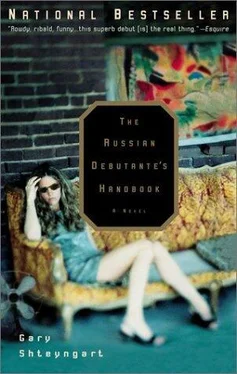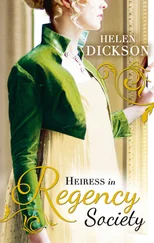Gary Shteyngart - The Russian Debutante's Handbook
Здесь есть возможность читать онлайн «Gary Shteyngart - The Russian Debutante's Handbook» весь текст электронной книги совершенно бесплатно (целиком полную версию без сокращений). В некоторых случаях можно слушать аудио, скачать через торрент в формате fb2 и присутствует краткое содержание. Город: New York, Год выпуска: 2003, ISBN: 2003, Издательство: Riverhead Books, Жанр: Современная проза, Юмористическая проза, на английском языке. Описание произведения, (предисловие) а так же отзывы посетителей доступны на портале библиотеки ЛибКат.
- Название:The Russian Debutante's Handbook
- Автор:
- Издательство:Riverhead Books
- Жанр:
- Год:2003
- Город:New York
- ISBN:0-7865-4177-6
- Рейтинг книги:4 / 5. Голосов: 1
-
Избранное:Добавить в избранное
- Отзывы:
-
Ваша оценка:
- 80
- 1
- 2
- 3
- 4
- 5
The Russian Debutante's Handbook: краткое содержание, описание и аннотация
Предлагаем к чтению аннотацию, описание, краткое содержание или предисловие (зависит от того, что написал сам автор книги «The Russian Debutante's Handbook»). Если вы не нашли необходимую информацию о книге — напишите в комментариях, мы постараемся отыскать её.
and
. The Russian Debutante’s Handbook Bursting with wit, humor, and rare insight,
is both a highly imaginative romp and a serious exploration of what it means to be an immigrant in America.
The Russian Debutante's Handbook — читать онлайн бесплатно полную книгу (весь текст) целиком
Ниже представлен текст книги, разбитый по страницам. Система сохранения места последней прочитанной страницы, позволяет с удобством читать онлайн бесплатно книгу «The Russian Debutante's Handbook», без необходимости каждый раз заново искать на чём Вы остановились. Поставьте закладку, и сможете в любой момент перейти на страницу, на которой закончили чтение.
Интервал:
Закладка:
“Which brings us to the most important point about the Groundhog,” Melashvili interrupted. “The Groundhog is a modern businessman. If the marketplace doesn’t tolerate prejudice, why should the Groundhog? He needs the best and brightest on his side no matter what shade their ass. And if Vladimir can tame America’s immigration police and get Mr. Rybakov his citizenship, well, who can tell how far the Groundhog will take him… Or where eventually he will land.”
“Yes,” Vladimir said, toying with the clasp of his sparkling Rolex. “Who can tell.” He realized that this was one of the first things he had said during the entire interview, or get-to-know-you session, or whatever this was. The others must have noticed this as well, for they looked at Vladimir expectantly. But what more could he say? He had been delighted just to listen to them.
Vladimir finally broke the silence. “Is there any butter?” he asked. “I like a little butter on my caviar sandwich. That’s how my mother, the esteemed Yelena Petrovna, used to make it for me when I was just a boy.”
A fresh stick of butter was produced. Melashvili gently unwrapped it himself. Several crewmembers helped Vladimir spread it on black bread.
Soon they would toast Mother’s health.
13. THE SEARCH FOR MONEY IN WESTCHESTER
DR. GIRSHKIN COUNTEDoff eight hundred dollars in fresh twenties, wetting his fingertips between each and every bill. “It’s better that you come to me with your sad money troubles,” he said to Vladimir, “than get some damn credit card…”
His fingers shaking with money-lust, Vladimir counted his father’s gift. He whispered the mounting dollar amounts in Russian, the language of longing, of homeland and Mother, his money-counting language: “Vosem’desyat dollarov… Sto dollarov… Sto dvadtsat’ dollarov…” Dr. Girshkin, too, whispered along, so that to Western ears father and son might have been caught in the act of solemn prayer.
Afterward, Vladimir was charmed by how his father neatly arranged a backyard table with napkins and cutlery, as if he was a guru past his prime, receiving one of the few visitors who still bothered to ascend his mountaintop. His father removed a recent Polaroid from the fridge door showing a smiling Dr. Girshkin holding a tremendous glossy-black flounder with the hook still embedded in one fatty lip, and placed it on Vladimir’s plate by means of introduction. The fish itself broiled away in the kitchen.
“Now, tell me about this new woman,” said his father, taking off his pants, which he did whenever his wife was off the premises. “She’s better than Challatchka?”
“One should not even compare,” Vladimir said, watching Grandmother wheel herself toward the table then spin around midyard to mind her defenseless oak trees.
“Then will you make a home with her?” his father asked. “No, I think not,” he answered the question himself. “It’s never too wise to settle down with any one woman so early in life. You know, when I was a young student at Leningrad State, I had my own apartment on the embankment of the River Moika, a prime spot for lechery. And so, at all times of the day, women fellow-students would make their way across the Palace Bridge to spend some time with your father. I was well known, a popular Jew.” He looked up to the heavens dimming above, as if his past life continued in some parallel universe.
“But the best, I’ll tell you, was when we were sent to work the collective farms during summer breaks. We were all put in freight cars, the women and men in the same cars, mind you! It took three or four days to get to the farms and so the pissing and the shitting was done right out the freight doors. You would be sitting, talking with your chums, when all of a sudden, to your left, a beautiful, round bottom would come out to do the most intimate of business. And some of these women were big and blond, you know, the Slavs! Not that there’s anything wrong with our own Jewish types, but, oh, when you found these women all alone in the middle of a hayfield and you’d say, ‘Excuse me, I would like to make your acquaintance, comrade so-and-so!’ You’d both be sweaty and shitty and drunk, but the fresh young sex out in the fields was sublime.”
He jumped up suddenly and said, “Flounder,” then rushed off to the kitchen. Vladimir chewed on the heel of the bread loaf and helped himself to vodka. He waved to Grandma, who shouted back something indecipherable and, using both of her frail arms, attempted to return the wave.
His father emerged with a sizzling pan and tossed mangled bits of flounder onto both of their plates; the art of filleting had never found favor with the doctor. “So what’s the money for?” asked his father. “You must buy this woman little gifts, the garbage women like?”
“No, it’s not that,” Vladimir said. “She enjoys having a good time. She doesn’t expect me to pay for her, but I have to pay for myself at least.” He neglected to mention that he had been adopted by the Ruoccos. One family at a time.
“I don’t know about this one,” Dr. Girshkin said, stuffing his face with fish and stir-fried cabbage. “Challatchka was so nice and quiet. You could survive on your pauper’s salary with her. But maybe this one will make you reconsider your priorities. I’m sure you know you have the smarts to make a lot of money in this country. And through honest work, not like…”
“I consider what you do honest work,” said Vladimir, who at one point in Hebrew school had had a long argument with himself concerning the morality of his father’s medical enterprise. The argument had been decided in his father’s favor, although the reasoning was laced with Talmudisms intricate enough for Vladimir to lose track of in subsequent reenactments. Something about stealing a rich neighbor’s cow, then charging him retail for the steaks.
“Honest, well,” his father said. “Look what happened to poor Shurik.”
“Oh?” Vladimir withdrew a long fish bone embedded between two molars. He remembered Uncle Shurik coarsely reprimanding Vladimir as a child for using the informal address ( ty as opposed to vy ) when chatting up Shurik’s fat Odessa wife. “What’s new with Shurik?”
“I don’t know the particulars, and I don’t want to know, personally, but they had a search warrant for his offices and everything.” His father shuddered visibly, then put his hands together as a calming measure. He poured himself a mug of vodka and took a swig. “They say Shurik specialized in pyramid schemes. Know what those are, Volodya?”
Vladimir shook his head.
“Sometimes it shocks me how little you know about anything. Pyramid schemes, also known as Ponzi schemes, after one Carlo Ponzi. In the 1920s, this guy Ponzi, a little immigrant from Parma, comes to this fat land of ours with some bright ideas. He sets up a little investment club, takes money from greedy idiots, promises them impossibly huge returns, pays them off for a while by stealing from the next round of idiots, and then he screws everybody. Can you imagine it?”
Actually, Vladimir could. A pyramid scheme! Something for nothing. It sounded like a neat idea. How exciting to think his relatives were so gainfully employed. Perhaps they knew Mr. Melashvili and his seafaring Georgians.
“Shurik’s going to get some good lawyers, I’m certain. Real American lawyers. But your mother is afraid that some of his files will lead to me, which is really science fiction when you think about it. As it stands, it would take some extraordinary sleuth work and a raft of self-incriminating patients to drag me into jail.” His father laughed then coughed fiercely to expel a small bone that had strayed too far into his throat.
Читать дальшеИнтервал:
Закладка:
Похожие книги на «The Russian Debutante's Handbook»
Представляем Вашему вниманию похожие книги на «The Russian Debutante's Handbook» списком для выбора. Мы отобрали схожую по названию и смыслу литературу в надежде предоставить читателям больше вариантов отыскать новые, интересные, ещё непрочитанные произведения.
Обсуждение, отзывы о книге «The Russian Debutante's Handbook» и просто собственные мнения читателей. Оставьте ваши комментарии, напишите, что Вы думаете о произведении, его смысле или главных героях. Укажите что конкретно понравилось, а что нет, и почему Вы так считаете.












